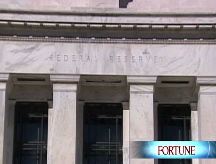Auto bailout spurs dollar buying
$13.4 billion loan mutes risk of industrywide collapse, sparking demand for short-term Treasurys, which investors need dollars to buy.
NEW YORK (CNNMoney.com) -- The U.S. dollar rallied against other major currencies Friday after a $13.4 billion auto bailout gave investors confidence about preserving their capital in U.S. Treasurys, which they need dollars to buy.
The dollar rose against the 15-nation euro, which fell 3.2 cents to $1.392. The value of the British pound also fell 0.8 cents to $1.493. And the dollar rose ¥0.33 to ¥89.12 against the Japanese yen.
President Bush announced a $13.4 billion loan for the troubled U.S. auto industry Friday. General Motors and Chrysler will be able to borrow cash to stay in business from the $700 billion financial sector bailout.
"This is probably taking some of the uncertainty out of the markets," said John Kicklighter, currency strategist with Forex Capital Markets.
Auto safety: General Motors (GM, Fortune 500) had previously warned that it could go bankrupt if it did not get $4 billion in federal loans before the end of the month. Chrysler had said it needed $4 billion in loans or it would run out of cash in January. Ford, which is in a better position than its counterparts, said it would not need federal assistance unless weak auto sales continued through 2009.
Investors have been worried that the collapse of a U.S. automaker could send a wave of layoffs through the U.S. auto industry, which employs about 2 million, including workers at GM, Chrysler and Ford, as well as parts makers and dealers, according to the Center for Automotive Research.
Now that worries about a catastrophic auto industry collapse have been averted, many foreign investors have turned to U.S. Treasurys as a way to preserve their investments. But in order to buy Treasurys, those investors need to first flock to U.S. dollars, according to Kicklighter.
Low-yielding government-backed Treasury bills, which carry much less risk than equities or other forms of investment, are often purchased by investors during times of economic volatility.
The most liquid 1- and 3-month short-term Treasury bills, which investors are most apt to use defensively, according to Kicklighter, rose Friday.
Fed blowback: The Fed cut its federal funds rate from 1% to a range between 0% and 0.25% on Tuesday. It was the central bank's 10th cut since September 2007.
"You got to wonder if we're going to run out of ammunition here, that's the real problem," said Andy Serwer, Fortune Magazine's managing editor, in a CNNMoney.com interview. "At some point you can't cut rates any further," he said.
While interest rate cuts are the U.S. central bank's main tool for boosting economic activity, many currency analysts worry about the long-term effects of lower interest rates on the dollar.
In Japan, the yen was retreating from a 13-year high against the dollar reached mid-week before the Bank of Japan cut a key interest rate from 0.3% to 0.1% in order to bolster its economy. The cut resulted in Japan's lowest rate since the BoJ ended its zero-rate policy in 2006.
However, the yen could continue to strengthen through 2009, as the global economy continues to deteriorate and investors seek safer investments, a Citigroup analyst said in a note to clients Friday.
Central banks of Europe and Britain are scheduled to hold meetings in January to determine whether or not to continue cutting their own key interbank lending rates. ![]()



